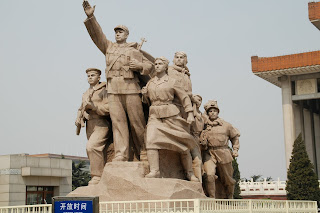I run into a fellow Canadian, Andrew, 23 from Ottawa. He’s got a surfer’s laidback calm and no shirts to speak of. He was backpacking across southeast Asia until Vietnam got ahold of him. He’s been here for four months. DJing six nights a week for room and board. Lounging in sun chairs during the day and trying to pickup whatever girls happen by. “See that one,” he points out to me, “I’ve been hanging onto her for every day she’s been here.” We order more buckets, gin this time (free on the house) while talking about home and playing pool. We’re so bad it takes and hour to finish.
At this time the Americans are gone, the girls too. Out comes the late night music. Ponytail dude and his gothic Asian girlfriend take requests. Nine Inch Nail, Deftones, Korn and Tool. We’re drinking more too. Ponytail dude keeps feeding us Rum and pineapple cocktails. I’m swooning on the dancefloor. Andrew’s friend from another bar comes over. Baggy jeans and t-shirt, and a toque pulled right down over his eyes, he doesn’t say a word just lights up his bong. We pass it around in the middle of the dancefloor. 1, 2, 5 times I don’t know, everything is spinning by this time.
When native tribes reach out to their gods, this must be how it feels. Lights dim, music overwhelming, multiple substances coursing through their veins, tired but not feeling it, elation taking over. ‘The Nobodies’, courtesy of family values patriarch Marilyn Manson comes on over the speakers. Slow and then it picks it up “today I’m dirty, I want to be pretty, tomorrow I know I’m just dead.” Then we’re screaming out the chorus “we’re the nobodies, want to be somebodies, will tell ya we know just who we are.” The surf keeps rolling in one wave at a time playing to its own melody. Somehow I end up back in my bungalow. Small miracles we can pray for them, but sometimes they just happen.












